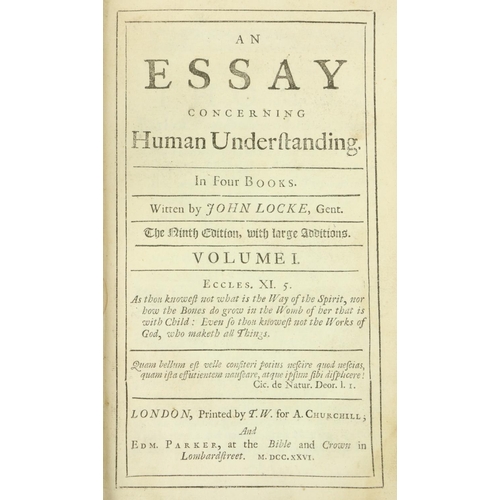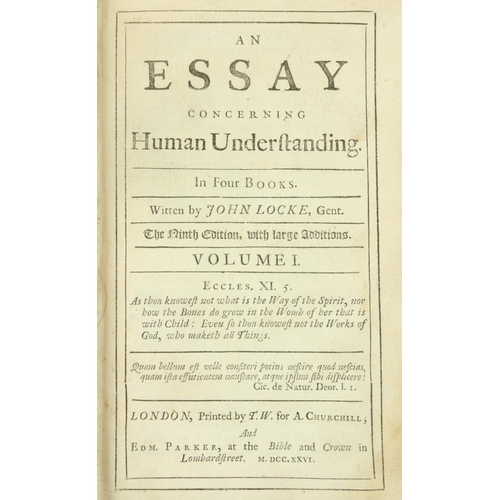Locke (John). An Essay Concerning Humane Understanding. In Four Books. Written by John Locke, Gent. The Second Edition, with large Additions, London: Printed for Awnsham and John Churchil, at the Black Swan in Pater-Noster-Row, and Samuel Manship, at the Ship in Cornhill, near the Royal Exchange, 1694, engraved portrait frontispiece by P. Vanderbanck after Sylvester Brounower (some soiling, with central horizontal crease and closed tear repaired to fore-margin without loss), 20 leaves, 407 pp., 6 leaves of index, title and following leaf with small closed tears repaired to lower blank margins, occasional marks and light soiling, final leaves (from Aaa1 onwards, page 361) with stain to centre of blank fore-margins, Hhh1 with long vertical closed tear repaired at inner margin, Ccc4 (page 383/384) torn with loss to lower outer corner, just touching a few letters, old half calf over marbled boards, heavily marked and some discolouration, some wear to head and foot of spine and edges, folio (Quantity: 1) ESTC R21459; Pforzheimer 601; PMM 164 (first edition); Wing L2740; Attig 229. The expanded second edition of Locke's famous philosophical essay, and the foundation of classical British empiricism. Part of the new material in this edition arose out of Locke's exchange with the young Irish scientist, William Molyneux, with whom he corresponded in the late 1680's and 1690's. This included the celebrated problem originally proposed by Molyneux in a letter to Locke in 1688 (first published by Locke here in Book 2): if someone born blind had learned to distinguish a globe and a cube by touch alone, and was then given sight, would that person be able to determine purely by sight which one was which? Both Locke and Molyneux thought that he or she would not. Further changes included the entire recasting of the section 'Of Power' dealing with freedom, and the addition of a new chapter 'Of Identity and Diversity', in which Locke equated personal identity with continuity of consciousness, and not with continuity of any spiritual substance. This is the second issue, with Awnsham as the printer (the first issue 'Printed for Thomas Dring...').
Locke (John). An Essay Concerning Humane Understanding. In Four Books. Written by John Locke, Gent. The Second Edition, with large Additions, London: Printed for Awnsham and John Churchil, at the Black Swan in Pater-Noster-Row, and Samuel Manship, at the Ship in Cornhill, near the Royal Exchange, 1694, engraved portrait frontispiece by P. Vanderbanck after Sylvester Brounower (some soiling, with central horizontal crease and closed tear repaired to fore-margin without loss), 20 leaves, 407 pp., 6 leaves of index, title and following leaf with small closed tears repaired to lower blank margins, occasional marks and light soiling, final leaves (from Aaa1 onwards, page 361) with stain to centre of blank fore-margins, Hhh1 with long vertical closed tear repaired at inner margin, Ccc4 (page 383/384) torn with loss to lower outer corner, just touching a few letters, old half calf over marbled boards, heavily marked and some discolouration, some wear to head and foot of spine and edges, folio (Quantity: 1) ESTC R21459; Pforzheimer 601; PMM 164 (first edition); Wing L2740; Attig 229. The expanded second edition of Locke's famous philosophical essay, and the foundation of classical British empiricism. Part of the new material in this edition arose out of Locke's exchange with the young Irish scientist, William Molyneux, with whom he corresponded in the late 1680's and 1690's. This included the celebrated problem originally proposed by Molyneux in a letter to Locke in 1688 (first published by Locke here in Book 2): if someone born blind had learned to distinguish a globe and a cube by touch alone, and was then given sight, would that person be able to determine purely by sight which one was which? Both Locke and Molyneux thought that he or she would not. Further changes included the entire recasting of the section 'Of Power' dealing with freedom, and the addition of a new chapter 'Of Identity and Diversity', in which Locke equated personal identity with continuity of consciousness, and not with continuity of any spiritual substance. This is the second issue, with Awnsham as the printer (the first issue 'Printed for Thomas Dring...').












Testen Sie LotSearch und seine Premium-Features 7 Tage - ohne Kosten!
Lassen Sie sich automatisch über neue Objekte in kommenden Auktionen benachrichtigen.
Suchauftrag anlegen